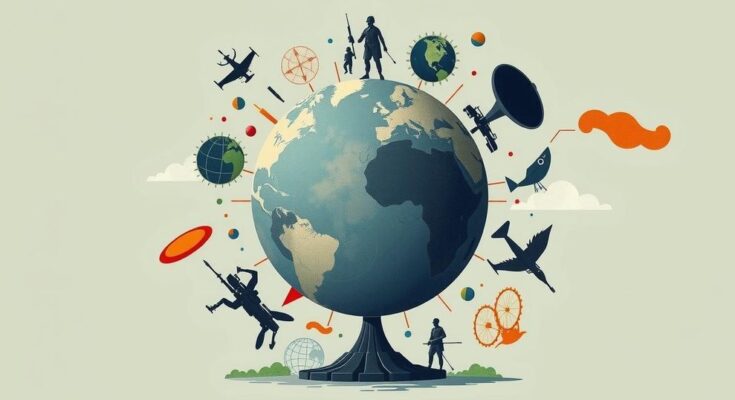The WEF’s Global Risks Report identifies armed conflict, misinformation, and environmental risks as critical challenges for global leaders. Following a survey of over 900 leaders, the report highlights immediate threats due to geopolitical tensions and the long-term impacts of climate change. Key recommendations emphasize the necessity of trust, collaboration, and proactive governance to address these global risks effectively.
The World Economic Forum’s (WEF) latest Global Risks Report highlights that armed conflict, misinformation, and environmental risks are key concerns among global leaders. The report is based on a survey conducted with over 900 leaders in various sectors, revealing a bleak outlook due to ongoing conflicts, climate change, and technological advancements that facilitate the spread of false information. The geopolitical landscape, particularly post-Russia’s invasion of Ukraine, is a primary worry for 2025, with potential escalation reliant on the United States’ responses.
Misinformation continues to pose significant short-term risks, undermining societal trust and governance. The report emphasizes challenges in distinguishing AI-generated falsehoods from those created by humans, exacerbating societal polarization. In addition, extreme weather events, armed conflict, and cyber threats are regarded as major concerns for the near future, with pollution noted as an emerging risk.
Looking towards the next decade, environmental threats dominate concerns, with extreme weather and biodiversity loss ranked as top risks. Nearly unanimous agreement exists regarding extreme weather being the most significant threat, compounded by changes to Earth systems, including sea-level rise and resource shortages. Survey respondents express pessimism about the global outlook by 2035, anticipating increased turbulence driven by environmental and social issues.
The WEF warns of a fragmented global landscape marked by great power competition, which will challenge multilateralism. The organization calls for rebuilding trust and fostering collaboration to secure a sustainable future. In this context, decisions made by leaders could either enhance resilience or exacerbate vulnerabilities, complicating the global risk landscape further.
The background of this article is rooted in the World Economic Forum’s Global Risks Report, which assesses global concerns as perceived by leaders in various sectors. The ongoing geopolitical conflicts, particularly with Russia and in the Middle East, along with escalating environmental risks due to climate change, highlight the urgency of international cooperation in mitigating these threats. The insights gathered from the Global Risks Perception Survey reflect the apprehensions of leaders regarding the future landscape of global stability and security.
In conclusion, the WEF’s Global Risks Report underscores the pressing concerns of armed conflict, misinformation, and environmental degradation among global leaders. The anticipation of turbulent times ahead highlights the need for collaboration and proactive responses to emerging global risks. As leaders navigate this complex landscape, their choices will be pivotal in determining the future stability and resilience of global systems.
Original Source: healthpolicy-watch.news




